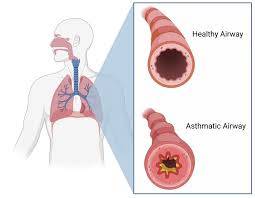Certainly, here are 20 potential causes, signs or symptoms, effects, and solutions related to asthma:
**Causes of Asthma:**
1. **Genetic Factors:** Family history of asthma can increase risk.
2. **Allergens:** Exposure to allergens like pollen, dust mites, or pet dander.
3. **Respiratory Infections:** Viral infections in childhood can contribute.
4. **Environmental Allergies:** Mold, pollen, and outdoor pollutants.
5. **Tobacco Smoke:** Exposure to secondhand smoke, especially during childhood.
6. **Occupational Exposures:** Dust, chemicals, or fumes in the workplace.
7. **Air Pollution:** High levels of outdoor air pollution.
8. **Exercise-Induced:** Physical activity can trigger exercise-induced asthma.
9. **Emotional Stress:** Stress can exacerbate symptoms in some individuals.
10. **Cold Air:** Breathing in cold air can trigger asthma attacks.
11. **Respiratory Irritants:** Strong odors, perfumes, or cleaning products.
12. **Gastroesophageal Reflux Disease (GERD):** Acid reflux can worsen asthma.
13. **Obesity:** Obesity is associated with a higher risk of asthma.
14. **Hormonal Changes:** Hormonal fluctuations, especially in women.
15. **Medications:** Some medications can worsen asthma symptoms.
16. **Weather Changes:** Sudden weather changes, like thunderstorms.
17. **Sinusitis:** Chronic sinus infections can be linked to asthma.
18. **Infections in Childhood:** Early respiratory infections can be a risk factor.
19. **Poorly Controlled Allergies:** Untreated or poorly managed allergies.
20. **Cesarean Birth:** Some studies suggest a link between C-section delivery and asthma.
**Signs and Symptoms of Asthma:**
1. **Wheezing:** High-pitched whistling sound during breathing.
2. **Shortness of Breath:** Difficulty breathing, especially during physical activity.
3. **Coughing:** Persistent cough, often worse at night or early morning.
4. **Chest Tightness:** A feeling of constriction or pressure in the chest.
5. **Increased Mucus Production:** Thick, sticky mucus in the airways.
6. **Difficulty Sleeping:** Symptoms may worsen at night.
7. **Frequent Respiratory Infections:** Due to compromised airways.
8. **Reduced Peak Flow:** Measurement of airflow may drop.
9. **Anxiety or Panic:** Can be triggered by breathlessness.
10. **Fatigue:** Due to increased effort required for breathing.
11. **Use of Accessory Muscles:** Neck and chest muscles used during breathing.
12. **Cyanosis:** Bluish tint to lips and nails in severe cases.
13. **Flaring Nostrils:** An indication of labored breathing.
14. **Inability to Speak in Sentences:** Shortness of breath affects speech.
15. **Tachycardia:** Increased heart rate during an attack.
16. **Unresponsive to Standard Asthma Medication:** A concerning sign.
17. **Silent Asthma:** Occurs without wheezing or obvious symptoms.
18. **Nasal Flaring:** Opening of nostrils during inhalation.
19. **Prolonged Exhalation:** Difficulty exhaling air.
20. **Peak Flow Variation:** Reduced lung function variability is a sign of poorly controlled asthma.
**Effects of Asthma:**
1. **Recurrent Symptoms:** Asthma is a chronic condition with periodic symptoms.
2. **Exacerbations:** Periods of worsened symptoms or attacks.
3. **Limitation of Daily Activities:** Reduced physical and social activities.
4. **School or Work Absences:** Frequent missed days due to asthma.
5. **Sleep Disturbance:** Nighttime symptoms disrupt sleep.
6. **Decreased Quality of Life:** Reduced overall well-being.
7. **Respiratory Distress:** Severe attacks can be life-threatening.
8. **Hospitalization:** Necessary during severe asthma attacks.
9. **Medication Side Effects:** Some asthma medications can have side effects.
10. **Emotional Impact:** Anxiety or depression related to asthma.
11. **Financial Costs:** Medical expenses for treatment and medication.
12. **Reduced Lung Function:** Over time, asthma can impair lung function.
13. **Exercise Limitations:** Reduced ability to engage in physical activities.
14. **Respiratory Infections:** Increased susceptibility to respiratory illnesses.
15. **Social Isolation:** Due to fear of asthma triggers.
16. **Bronchial Hyperresponsiveness:** Increased sensitivity to irritants.
17. **Decreased Lung Growth in Children:** Can affect lung development.
18. **Rescue Medication Dependency:** Frequent use of quick-relief inhalers.
19. **Airway Remodeling:** Long-term inflammation can lead to structural changes.
20. **Mortality:** In severe cases, asthma can be fatal.
**Solutions for Asthma:**
1. **Medications:** Follow prescribed medication regimens as directed by a healthcare provider.
2. **Trigger Avoidance:** Identify and avoid asthma triggers.
3. **Allergen Control:** Implement measures to reduce exposure to allergens.
4. **Flu and Pneumonia Vaccination:** Protect against respiratory infections.
5. **Asthma Action Plan:** Develop and follow a personalized asthma management plan.
6. **Lifestyle Modifications:** Maintain a healthy lifestyle with regular exercise and a balanced diet.
7. **Breathing Techniques:** Learn techniques for better breathing control.
8. **Allergy Management:** Address allergies with appropriate treatments.
9. **Education:** Understand your condition and how to manage it.
10. **Monitor Peak Flow:** Regularly measure peak expiratory flow.
11. **Rescue Inhaler:** Carry a quick-relief inhaler for emergencies.
12. **Pulmonary Rehabilitation:** Participate in structured programs for better lung health.
13. **Emotional Support:** Seek counseling or support groups for mental health.
14. **Annual Check-ups:** Regularly see your healthcare provider for asthma management.
15. **Avoid Smoking and Secondhand Smoke:** Protect your lungs from tobacco exposure.
16. **Control GERD:** Manage acid reflux to reduce asthma exacerbations.
17. **Stay Hydrated:** Maintain proper hydration.
18. **Sleep Hygiene:** Ensure restful sleep by addressing nighttime symptoms.
19. **Patient-Provider Communication:** Keep open communication with your healthcare team.
20. **Emergency Plan:** Know when to seek emergency care for severe attacks.




No comments yet
Be the first to share your thoughts!